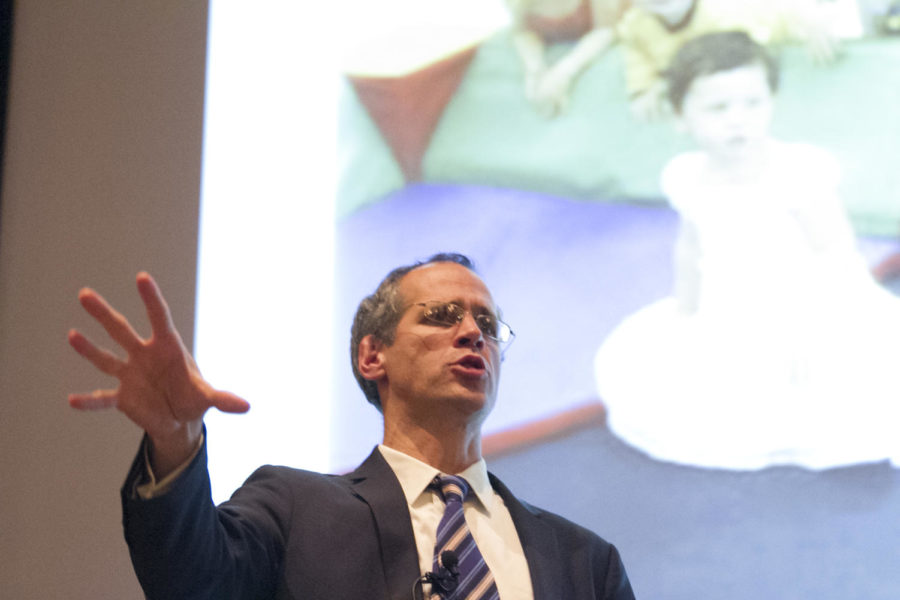‘Planet Money’ hosts provide comical spin to economics
September 19, 2012
National Public Radio “Planet Money” hosts Adam Davidson and Alex Blumberg offered a comical spin on what most Americans see as a very depressing subject.
The Great Hall of the Memorial Union was filled Wednesday, Sept. 19, with an excited crowd waiting anxiously to hear Davidson and Blumberg’s satirical views on the “weirdness” of the Federal Reserve and solutions that could fix our country’s current financial situation.
“I saw it in the paper, and it sounded interesting. I don’t quite know what to expect,” said Ames resident Marjorie Kannel before Davidson and Blumberg took the stage.
The pair became famous for their radio documentary, “The Giant Pool of Money,” that focused on the housing crisis of 2008. Davidson and Blumberg produce a semiweekly podcast of “Planet Money” in addition to writing a blog.
Davidson introduced the proposed hero who could save the country with a large picture of Federal Reserve Chairman Ben Bernanke.
“As with every terrifying drama, there’s always always a superhero, and that superhero is always bald and bearded,” Davidson said.
As Davidson explained the “strange” nature of the Federal Reserve and its ability to control the country’s money supply, he said for many people, “confidence is ensured by Bernanke.”
“The Fed has a variety of tools, and we don’t have to get into details, but basically they’re able to create money at will,” Davidson said. “They’re the one organization in the country that can just wake up one morning and say, ‘I think there should be $1 trillion more money. I’m going to type on a computer screen, and now there’s a trillion dollars more in the world.’”
Davidson explained how Bernanke advised the Bank of Japan during one of its economic slumps about 10 years ago, to invoke the use of quantitative reasoning.
“Quantitative reasoning is when the Fed or the Bank of Japan or the Bank of England say: ‘We’re going to create new money out of nothing, and then we’re going to use it to buy stuff that banks own,’” Davidson said.
Davidson continued on to say: “Our goal is to make those banks give up the stuff they own, have more money, and then do something with that money; they have to use that money in some way. We’re hoping that that’s the thing that is going to prod the economy back into recovery.”
Blumberg explained that, as of last week, Bernanke essentially said in a press announcement that the Fed will continue to put money into the financial sector until unemployment improves. Blumberg and Davidson said this statement by Bernanke contains the most dramatic words spoken for the year of 2012 and will affect our lives for the next few years.
Blumberg and Davidson also brushed on the topic for the need of education to build proper skills, which will give us the hope but no real guarantee of becoming a middle class citizen.
“In this old America, which wasn’t that old — it’s like 20, 30 or 40 years ago — you could become part of the middle class by using your body as well as your brain; there were two aspects of it,” Blumberg said. “That is over; it went away pretty quickly.”
Now that robotic engineering has taken over millions of jobs, education is now needed to monitor the machines in plants.
Blumberg explained a study done by economist James Hector, which found that training individuals with a lack of higher education is usually unsuccessful, and it may have to do with simple “soft” skills that weren’t taught to them in preschool. Monster.com lists the top six soft skills as: communication, collaboration, adaptability, problem solving, critical observation and conflict resolution.
“[Soft skills] aren’t the skills that build knowledge but the skills that allow you to aquire knowledge and use it effectively,” Blumberg said.
The Greater Iowa Credit Union sponsored the event, which ended in rousing applause and a question-and-answer session with the crowd.
Robert Schmid, senior in mechanical engineering, was one of the lucky few selected to ask a question from the crowd.
“I thought it was excellent; I mainly wanted to go because this upcoming election is going to be really important, and I wanted some more insight because of their starkly different economic policy,” Schmid said.
For more information on the “Plant Money” radio broadcasts or podcasts, visit their website at www.npr.org/blogs/money/.







